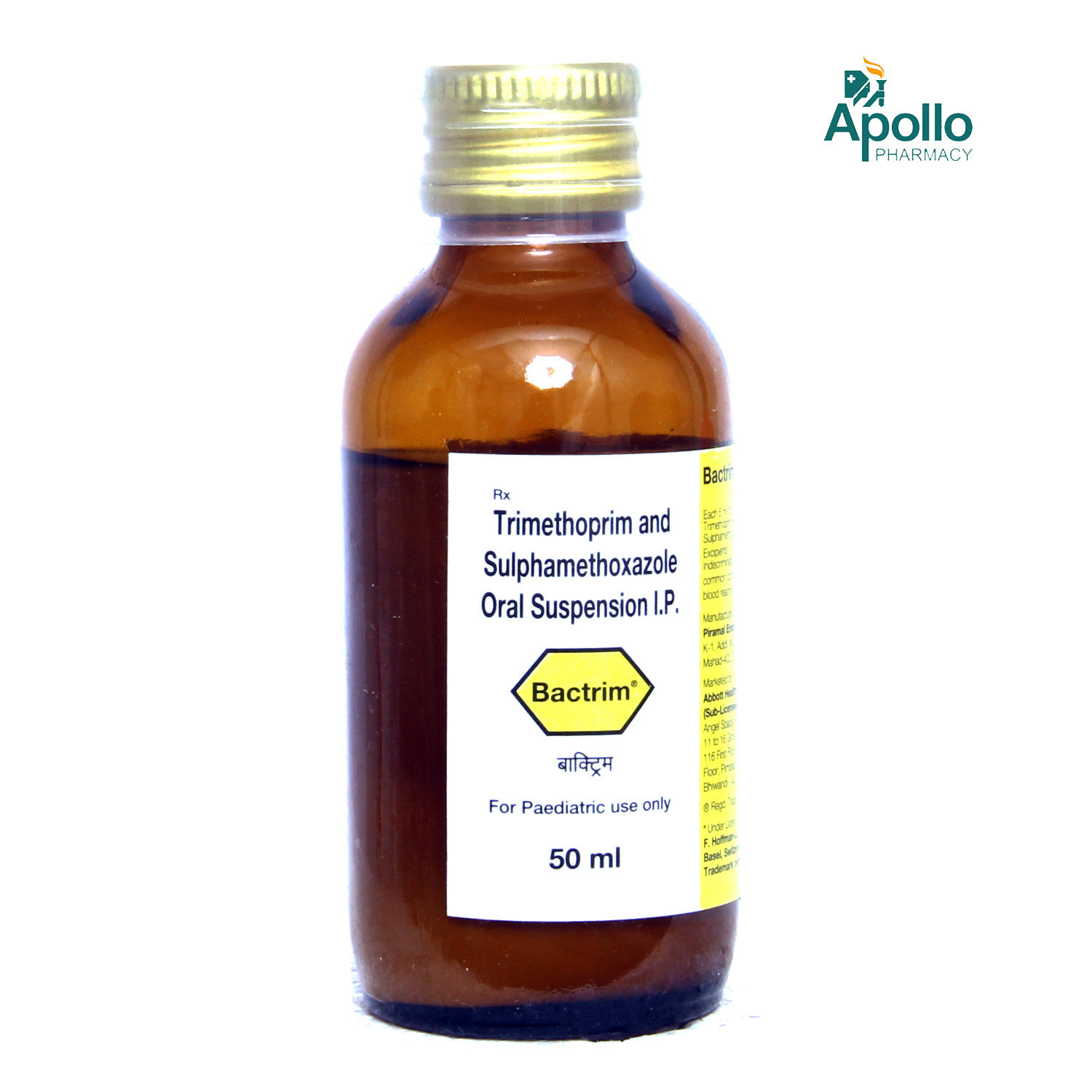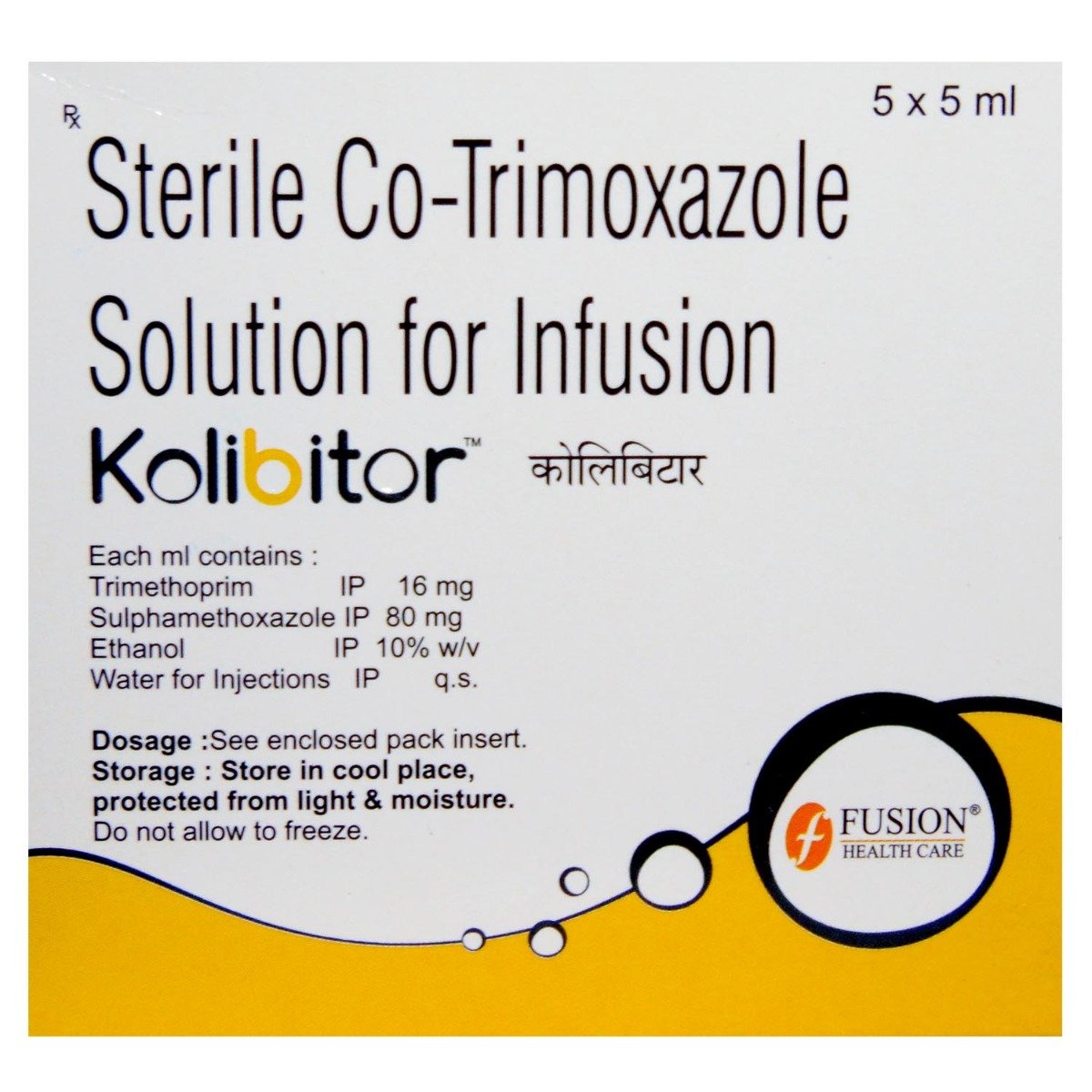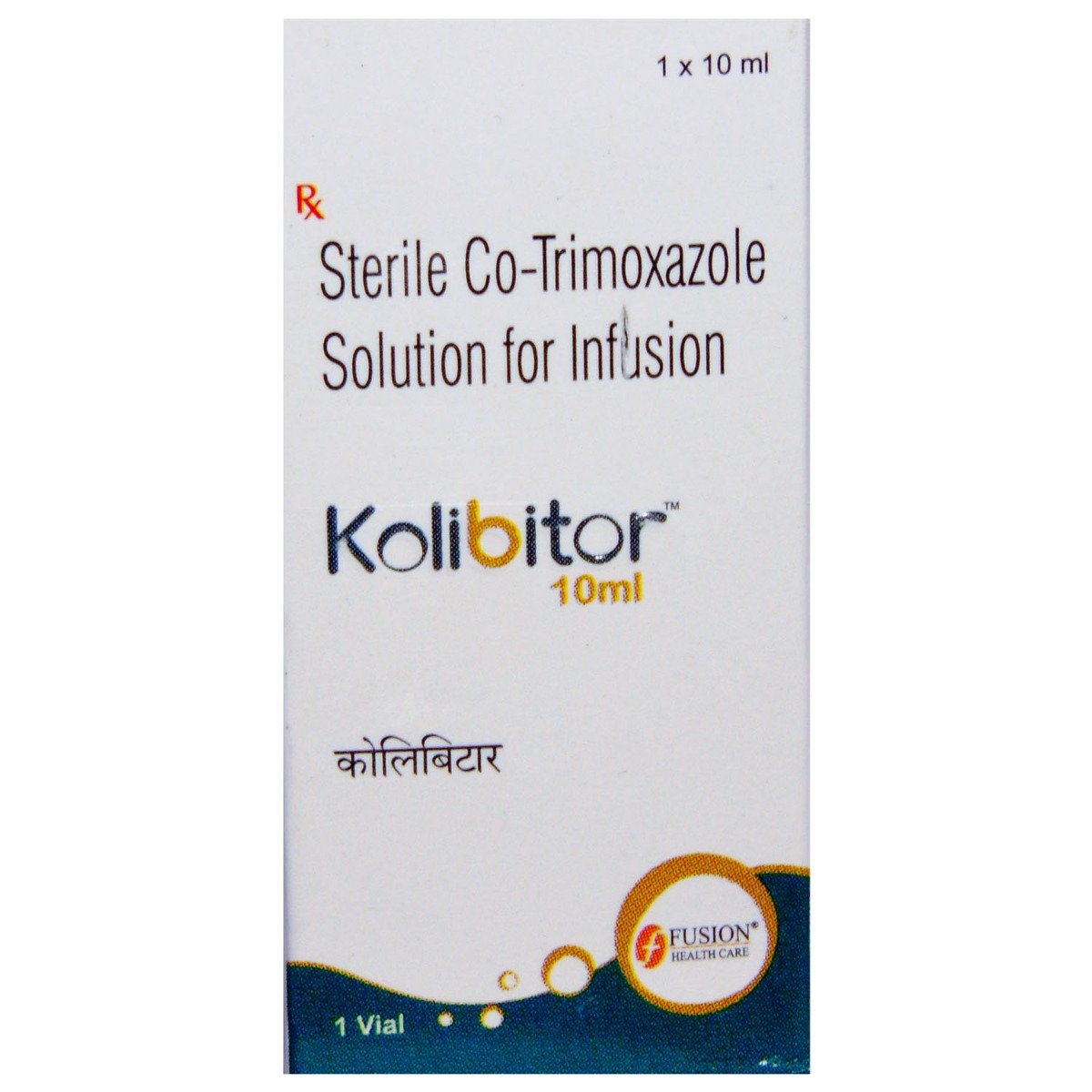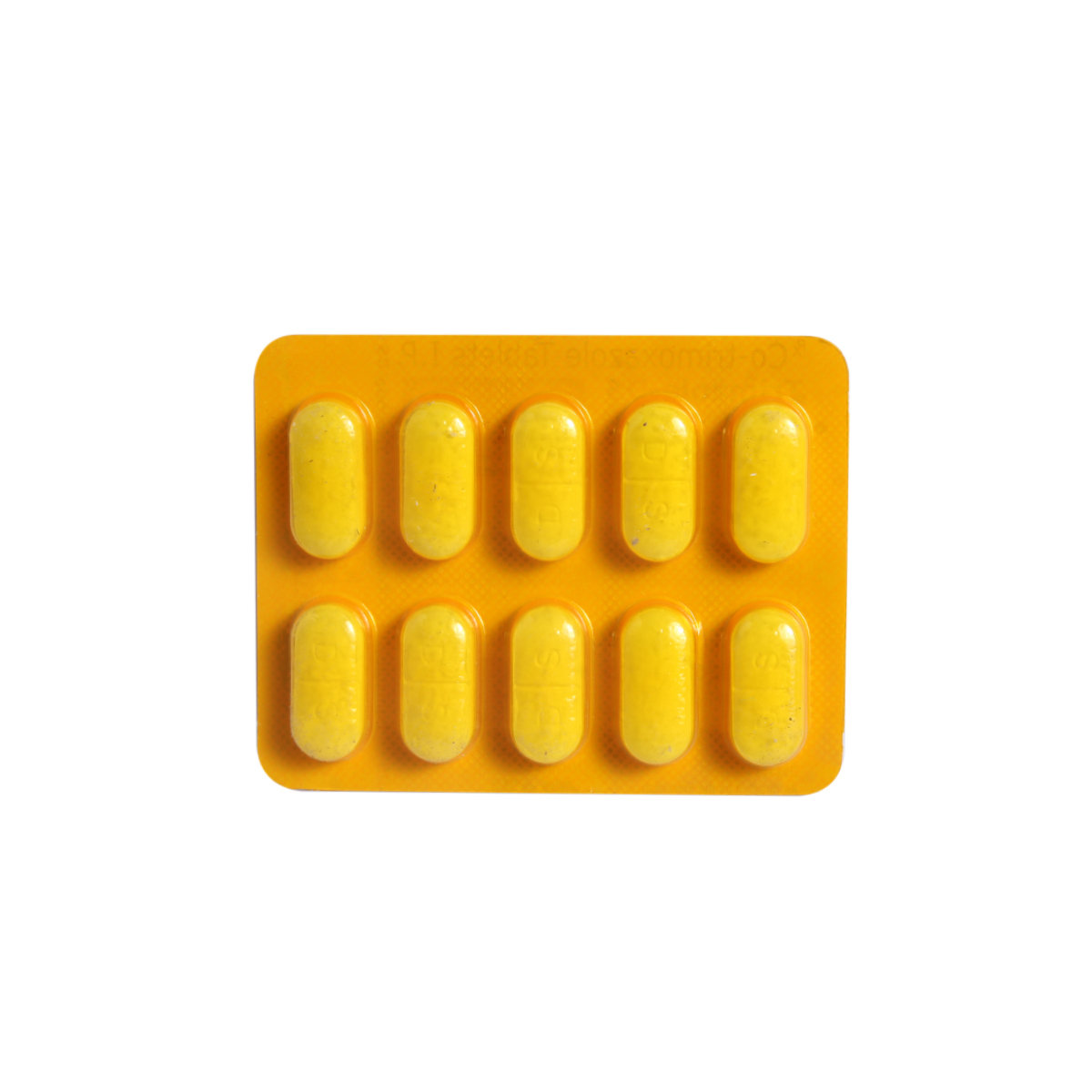Sulphamethoxazole+trimethoprim
About Sulphamethoxazole+trimethoprim
Sulphamethoxazole+trimethoprim belongs to the group of medicines called antibiotics used to treat and prevent lung infections caused by a bacteria called Pneumocystis jirovecii, infections caused by a bacteria called Toxoplasma, urinary tract infections (water infections), respiratory tract infections such as bronchitis, ear infections such as otitis media. Bacterial infections are caused due to the multiplication of harmful bacteria inside or on the body. Infectious or harmful bacteria can make you sick and reproduce quickly in your body. These harmful bacteria produce chemicals known as toxins, which can damage tissue and make you sick. Sulphamethoxazole+trimethoprim does not work against infections caused by the virus, including cold and flu.
Sulphamethoxazole+trimethoprim contains Trimethoprim (folic acid inhibitors) and Sulfamethoxazole (sulfonamides). Trimethoprim prevents the formation of tetrahydrofolic acid, and sulfamethoxazole stops the bacteria from making dihydrofolic acid. Tetrahydrofolic acid and dihydrofolic acid are essential for the formation of proteins and nucleic acids, which are necessary for the survival of bacteria. By inhibiting these, Sulphamethoxazole+trimethoprim kills the bacteria and stops their growth. Thereby, it helps to treat bacterial infections.
Take Sulphamethoxazole+trimethoprim as prescribed by your doctor. The dose and duration of Sulphamethoxazole+trimethoprim can vary depending on your condition and the severity of the infection. In some cases, you may experience certain common side effects such as headache, diarrhoea, skin rashes, nausea, vomiting, heart problems, fever, convulsions or seizures, blood or cloudiness in your urine, hallucinations, and mouth ulcers. Most of these side effects do not require medical attention and will resolve gradually over time. However, you are advised to talk to your doctor if you experience these side effects persistently.
Before starting Sulphamethoxazole+trimethoprim, please inform your doctor if you have any allergy (against any antibiotic), or kidney or liver problems. Do not take Sulphamethoxazole+trimethoprim on your own as self-medication may lead to antibiotic resistance in which antibiotics fail to act against specific bacterial infections. Consult your doctor before taking Sulphamethoxazole+trimethoprim if you are pregnant or breastfeeding. Avoid alcohol consumption to prevent unpleasant side effects such as fast heartbeats, warmth or redness under your skin, tingly feeling, nausea, and vomiting. Sulphamethoxazole+trimethoprim should not be given to children below 12 years. Keep your doctor informed about all the medicines you are taking and your health condition to rule out any unpleasant side effects. Also, it is recommended to complete the course of medicine even if you feel better, as it is an antibiotic. Leaving it in between may lead to even severe infection that will, in fact, stop responding to the antibiotic (antibiotic resistance).
Uses of Sulphamethoxazole+trimethoprim
Medicinal Benefits
Sulphamethoxazole+trimethoprim belongs to the group of medicines called ‘antibiotics’ used to treat various bacterial infections of the urinary tract, respiratory tract (bronchitis), ear (otitis media), lungs (pneumonia), skin, brain, and toxoplasmosis (infection caused by a bacteria called toxoplasma). Sulphamethoxazole+trimethoprim contains Trimethoprim (folic acid inhibitors) and Sulfamethoxazole (sulfonamides). Trimethoprim prevents the formation of tetrahydrofolic acid, and sulfamethoxazole stops the bacteria from making dihydrofolic acid. Tetrahydrofolic acid and dihydrofolic acid are essential for the formation of proteins and nucleic acids, which are necessary for the survival of bacteria. By inhibiting these, Sulphamethoxazole+trimethoprim kills the bacteria and stops their growth. Thereby, it helps to treat bacterial infections. Sulphamethoxazole+trimethoprim is a broad-spectrum antibiotic that is active against a wide range of gram-positive and gram-negative bacteria such as Streptococcus pneumonia, Escherichia coli, Klebsiella species, Enterobacter species, Haemophilus influenzae, etc.
Directions for Use
Storage
Side Effects of Sulphamethoxazole+trimethoprim
- Mouth ulcers
- Headache
- Mouth ulcers
- Diarrhea
- Blood or cloudiness in your urine
- Depression
- Tingling or numbness in your hands and feet
- Hallucinations
Drug Warnings
Do not take Sulphamethoxazole+trimethoprim if you are allergic to any of its contents if you have severe liver or kidney problems, thrombocytopenia (low levels of platelets in the blood), or porphyria (rare blood problem that affects the skin or nervous system). Do not take Sulphamethoxazole+trimethoprim on your own, as self-medication may lead to antibiotic resistance in which antibiotics fail to act against specific bacterial infections. Consult your doctor immediately if you experience skin rash or prolonged, significant diarrhoea with abdominal pains. Talk to your doctor before taking Sulphamethoxazole+trimethoprim if you have severe allergies, asthma, ulcers, blood disorders, thyroid dysfunction, diabetes, are elderly, underweight, or malnourished if you have a folic acid deficiency, glucose-6-phosphate dehydrogenase deficiency, or high levels of potassium in the blood. Avoid taking Sulphamethoxazole+trimethoprim if you are pregnant or breastfeeding unless prescribed by a doctor. Avoid alcohol consumption while taking Sulphamethoxazole+trimethoprim to prevent unpleasant side-effects such as fast heartbeats, warmth or redness under your skin, tingly feeling, nausea, and vomiting. Sulphamethoxazole+trimethoprim will not treat a viral infection. Drink plenty of fluids to prevent kidney stones while taking Sulphamethoxazole+trimethoprim.
Drug Interactions
Drug-Drug Interactions: Sulphamethoxazole+trimethoprim may interact with medicines used to treat the symptoms of Parkinson's disease (amantadine), drugs used to prevent organ rejection(cyclosporine), a medicine used to relieve pain, swelling (indomethacin), drugs used to decrease the toxic effects of methotrexate (leucovorin), anticancer drug (methotrexate), medicines used to treat the parasite diseases (pyrimethamine), blood pressure medication (benazepril, quinapril, enalapril, lisinopril, ramipril); a diuretic or 'water pill' (chlorthalidone, hydrochlorothiazide), a blood thinner (warfarin).
Food-Drug Interactions: Avoid alcohol consumption while taking Sulphamethoxazole+trimethoprim to prevent unpleasant side-effects such as fast heartbeats, warmth or redness under your skin, tingly feeling, nausea, and vomiting.
Drug-Disease Interactions: If you have severe liver disease, kidney disease, asthma, malnourishment, HIV or AIDS, or thyroid disorders, inform your doctor before taking Sulphamethoxazole+trimethoprim.
Drug-Drug Interactions Checker List:
Safety Advice

Alcohol
unsafeAvoid alcohol consumption while taking Sulphamethoxazole+trimethoprim to prevent unpleasant side effects.

Pregnancy
cautionPlease consult your doctor before taking Sulphamethoxazole+trimethoprim if you are pregnant. Your doctor will prescribe this medicine only if the benefits outweigh the risks.

Breast Feeding
cautionPlease consult your doctor if you are breastfeeding; your doctor will prescribe this medicine only if the benefits outweigh the risks.

Driving
cautionIt is unknown whether Sulphamethoxazole+trimethoprim affects your ability to drive and operate machinery. Drive only if you are physically stable and mentally focused; you may experience dizziness or fatigue after taking Sulphamethoxazole+trimethoprim you should not drive or operate any machinery or vehicles.

Liver
cautionPlease consult your doctor before taking Sulphamethoxazole+trimethoprim if you have liver conditions. Your doctor will weigh the benefits and any potential risks before prescribing.

Kidney
cautionSulphamethoxazole+trimethoprim to be taken with caution, especially if you have a history of kidney conditions. Your doctor may adjust the dose based on your condition.

Children
unsafeSulphamethoxazole+trimethoprim should not be given to children below 12 years.
Habit Forming
Diet & Lifestyle Advise
- Antibiotics can alter the useful bacteria in the stomach, which helps in digestion. Therefore, you are advised to take foods rich in probiotics, such as yoghurt/curd, kefir, sauerkraut, tempeh, kimchi, miso, kombucha, buttermilk natto, and cheese.
- Eat fiber-rich food like whole grains, beans, lentils, berries, broccoli, peas, and bananas.
- Avoid foods rich in calcium, grapefruit, and grapefruit juice, as they might hinder antibiotic absorption.
- Avoid the consumption of alcohol to treat your condition effectively.
- Avoid the usage of tobacco.
- To cure your condition, effectually complete the full course of Sulphamethoxazole+trimethoprim even though you find symptomatic relief.
Special Advise
- Sulphamethoxazole+trimethoprim may affect certain laboratory test results, such as blood tests. Inform the person doing the tests that you are taking Sulphamethoxazole+trimethoprim. Your doctor may advise you to get regular tests if you have kidney problems or if you have been prescribed Sulphamethoxazole+trimethoprim for a longer duration to know if the medicine is working properly.
Patients Concern
Disease/Condition Glossary
Bacterial infections: A bacterial infection is a condition in which harmful bacteria enter, multiply, and infect our body. Infectious or harmful bacteria can make you sick and reproduce quickly in your body. These harmful bacteria produce chemicals known as toxins, which can damage tissue and make you sick. It can target any body part and multiply very quickly. When you get infected with bacteria, you can experience generalized symptoms like fevers, chills, and fatigue. Bacteria are of various forms comprising, commonly spherical, rod, and spiral-shaped. Bacterial infections vary from minor illnesses like sore throat and ear infections to severe brain infections like meningitis and encephalitis. Anyone can become infected with a bacterial infection. But, people with weak immune systems or taking immunosuppressive medicine are more prone to bacterial infection.
FAQs
Sulphamethoxazole+trimethoprim contains Trimethoprim (folic acid inhibitors) and Sulfamethoxazole (sulfonamides). Trimethoprim prevents the formation of tetrahydrofolic acid, and sulfamethoxazole stops the bacteria from making dihydrofolic acid. Tetrahydrofolic acid and dihydrofolic acid are essential for the formation of proteins and nucleic acids, which are necessary for the survival of bacteria. By inhibiting these, Sulphamethoxazole+trimethoprim kills the bacteria and stops their growth. Thus, helps to treat bacterial infections.
Sulphamethoxazole+trimethoprim causes thrush or candidiasis, a fungal infection occurring due to the overgrowth of yeast-like fungus in the mouth or throat. Regularly rinse your mouth with water to prevent the growth of fungus.
Diarrhoea might be a side-effect of Sulphamethoxazole+trimethoprim. Drink lots of fluids and eat food rich in fibre if you experience diarrhoea. If you find blood in your stools (tarry stools) or if you experience prolonged diarrhoea with abdominal pain, stop taking Sulphamethoxazole+trimethoprim and consult your doctor. Do not take anti-diarrheal medicine on your own.
It is recommended to complete the course of Sulphamethoxazole+trimethoprim even if you feel better as it is an antibiotic, and leaving it in between may lead to recurring infections. Continue taking Sulphamethoxazole+trimethoprim for as long as your doctor has prescribed to treat your condition effectually.
Sulphamethoxazole+trimethoprim may affect certain laboratory test results. Inform the person doing the tests that you are taking Sulphamethoxazole+trimethoprim.
Sulphamethoxazole+trimethoprim may cause high levels of potassium in the blood, leading to abnormal heartbeats (palpitations). Regular potassium levels and heart rate monitoring is recommended while taking Sulphamethoxazole+trimethoprim.









